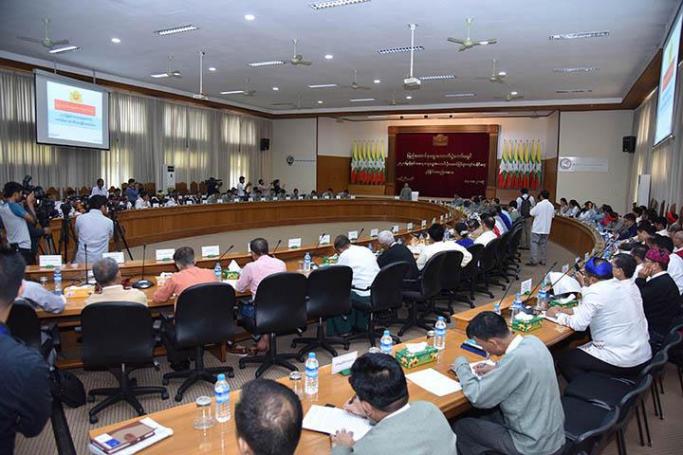
A politically tense situation has evolved in Myanmar, a country „coming out of decades of darkness of military rule“. In 2010, it started its path towards democratic transition, an endavour which in these days seems endangered by a renewed power struggle between the military and the civilian government. An „End-of-January-Sabre-Rattling “, performed by the Tatmadaw, the Burmese military, paired with riots and protests across the country results in the present uneasy situation. In the center of all lie the unresolved questions concerning the process and results of the November 8, 2020 nationwide elections in Myanmar.
Ever since the National League of Democracy (NLD), the party of Daw Aung San Suu Kyi, won another stunning victory on this day, the Tatmadaw tried to grasp different opportunities to question the legality of the election result, even though not all of them at once. Those questions were primarily put by the Union Solidarity and Development Party (USDP), the proxy party of the military. It was established in 2010 in continuity to present military parties. The USDP suffered a huge defeat in the most recent elections, and hence it totally deverged from Than Shwes visions of a bright future for Myanmar‘s military. Than Shwe was the chief of the Burmese junta in the years of 1992 to 2011.
In doubting the 2020-election results, the USDP introduced as the main argument the intransparency of the Union Election Commission’s (UEC) decisions during the election process. The UEC as a constitutional body was founded in 2010, in a time, when the “newly civilian-turned” generals were still convinced of a successful continuity of their strong political roles in Myanmar. For that purpose alone the Constitution of 2008 had been written. Myanmar’s charter was designed as a tailor-made solution for the country‘s and the military’s future by the then ruling junta.
That the UEC is not an independent body, being directly connected to the presidential office, was recently severely admonished by Myanmar’s election observers like the U.S. Carter Center. The lack of transparency related to the decisions of disenfranchising millions of voters especially in Rakhine, Kachin, and Shan State was perceived extremely negatively.
Moreover, the UEC has shown at several other points a heavy mismanagement, now evoking protests and riots in whole Myanmar, and especially in Yangon.
The NLD, as of today, asked her supporters „to stay calm“ despite protests of military supporters.
In the weeks before these events now to be witnessed, the Tatmadaw had been calling in „voters’ fraud“ again and again. These are accusations which have been left unanswered by the UEC as well as the NLD until now. The NLD is well known for despising dissent and rejected „calls to convene an emergency parliament session to tackle the alleged poll irregularities.“
The general explanation for the military’s accusations was and is a „non-acceptance of a humiliating election defeat“ on the side of the USDP.
But all accusation against the UEC seemed in vain. As The Irrawaddy wrote last Friday: „The losing parties attempt will probably fail as the 2008 Constitution grants the UEC the final decision over the electoral process and no legal action can overrule the body.“
However, a new development has started; on Friday a „Writ of Quo Warranto“ was filed against the UCE including its chairman U Hla Thein and Union President U Win Myint. Now, the Supreme Court of Myanmar in Nay Pyi Taw will hear those cases of „electoral misconduct“ as „general civil cases“. The mentioned writ is a legal instrument of checking on governance procedures. It is a procedure also taking place on state-level in the United States.
Last Thursday (28.01), the UEC rejected all accusations.
Rumours of a power-grabbing military in Myanmar could not be silenced in the last couple of days. The specter of a „coup d‘ état“ showed up the moment, when the military spokesman Maj.-Gen. Zaw Min Tun on Tuesday, January 26, did not rule out the possibility that the military, even though „abiding to the Consitution“ would „take responsibility for the state.“
For many observers, this was the same like saying: „If necessary, we will take over.“
The international community reacted by stressing the positive forces of democratic transition. The United Nations were showing „great concern“.
Yesterday, January 30, Min Aung Hlaing, as the Commander-in-Chief of the Myanma Armed Forces, finally tried to ease the growing tensions by declaring via the state medium The Global New Light of Myanmar that „the Constitution will be respected“.
So far, the political actors – the UEC, the civilian and the military government, could not find a democratic consensus over resolving the allegations of voters‘ fraud by the UEC.
One should keep in mind that despite all flaws and missed chances of the first term of the NLD (2015-2020), the Tatmadaw and the civilian government with State Counsellor Daw Aung San Suu Kyi as its leading figure, have established a more or less well functioning working relationship. This fact establishes grounds for expectations that a peaceful solution in this unsteady situation will be feasible. Communication will be the case in point.
Another spark of hope had been sown by an Irrawaddy writer who shared the following remark uttered „by a senior-level officer“ saying: „If the military acts, it gives no signals in advance.“
In the current situation, the first session of the Union Parliament , the Pyidaungsu Hllutaw, has been delayed for one day – from February 1st to February 2nd. This is another sign of a serious constitutional crisis, but hope remains that this crisis will be a chance for an even more democratic approach in Myanmar’s future election affairs.
Once, the losing of power was described as „nightmarish for the military“. The assuming of power by the military now would be nigthmarish for more than one group in the cosmos of Myanmar.
sources: The Myanmar Times. Frontier Myanmar. The Irrawaddy. mizzima.
